
A United Nations International Tribunal Panel has ruled against China saying that there was no evidence to suggest that China had historically exercised exclusive control over South China Sea waters or resources.
While delivering the judgment, the world's oldest international arbitration tribunal, the Permanent Court of Arbitration (PCA) located in the Hague, Netherlands said China had violated Philippines' sovereign rights and caused "severe harm to the coral reef environment" by building artificial islands.
The tribunal also "found that China had violated the Philippines' sovereign rights in its exclusive economic zone by (a) interfering with Philippine fishing and petroleum exploration, (b) constructing artificial islands and (c) failing to prevent Chinese fishermen from fishing in the zone.
The tribunal also held that fishermen from the Philippines (like those from China) had traditional fishing rights at Scarborough Shoal and that China had interfered with these rights in restricting access. The tribunal further held that Chinese law enforcement vessels had unlawfully created a serious risk of collision, when they physically obstructed Philippine vessels, according to a report by the Guardian.
Even though the ruling is binding, it is non-enforceable by the Permanent Court of Arbitration which based its judgment on the United Nations Convention on the Law of the Sea (UNCLOS), that both countries have signed.
China has reportedly called the decision "ill-founded" and says it will not be abide by the ruling. It claims almost all of the South China Sea, including reefs and islands that are also claimed by other countries.
Chinese state news agency Xinhua said that "as the panel has no jurisdiction, its decision is naturally null and void". China's defence ministry said its troops would "unswervingly safeguard state sovereignty, security, maritime rights and interests," according to state broadcaster CCTV.
The dispute over islands in the South China Sea, which has caused tensions in South East Asia was brought to the UN for arbitration almost three years ago after Philippines had challenged China's claims over the strategic use of the disputed territories. It had asked the court to find out if Beijing's claims to most of the territories in the region were valid or not.
The judgment comes against the backdrop of military brushes between Asia's largest economy and the Philippines, Vietnam, Malaysia, Brunei and Taiwan, who are believed to hold untapped oil and gas reserves. The sea's shipping lanes connect East Asia with Europe and the Middle East. Over 4.5 trillion euros in ship-trade passes through it every year.












